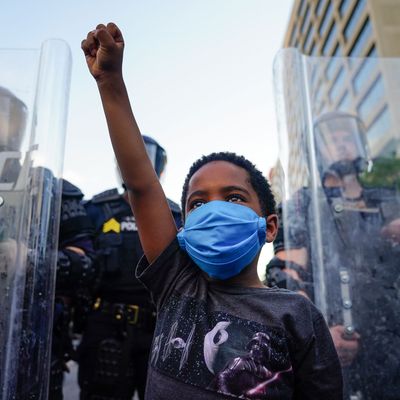
The initial fervor of May and June’s nationwide street protests has, inevitably, faded. Has the momentum for change faded along with it? I spoke with features writer Zak-Cheney Rice about where America’s racial-justice movement goes from here.
Ben: We’re almost two months out from the killing of George Floyd and the massive nationwide protest movement it spurred. The most intense demonstrations have inevitably died down, though plenty of people are still in the streets. With the caveat that it’s much too early to evaluate the movement from the perspective of shifting actual policy (though it has already inspired some major changes in local police departments) — do the events of the last few weeks feel like an enduring shift in racial politics to you or more like another fleeting moment?
Zak: It’s obviously hard to predict the durability of this kind of thing. For example, Black Lives Matter, as a movement, seemed to have almost totally died out with the onset of the Trump era, until it very clearly hadn’t. So who knows how the groundwork being laid today shows up in the future. City budgets are being reworked all the time, so I guess my other answer to this depends on your definition of “fleeting,” but it’s worth noting that police budgets have been slashed in a number of big cities — Los Angeles, several cities in the Bay Area, New York, Philadelphia. The Minneapolis city council has voted to dismantle its police department and “reimagine” public safety, though it’s unclear what that means in practice. Asheville’s city council passed a resolution committing to reparations for its black residents, which is also murky in terms of what it’ll actually look like. So, short answer, there are clear material shifts happening that you can hang your hat on. At the same time, backlash is inevitable, as is compromise. And depending how it all goes, and how easily its shortcomings can be politicized by reform’s detractors, public sentiment could swing pretty hard again in the other direction.
Ben: Yeah, about a month ago, you wrote that the multiracial coalition driving the protests was “built on a shaky foundation, rife with conditions and subject to sea changes that already seem to be under way.” Has your view on just how shaky or sturdy that foundation might be shifted at all?
Zak: My short answer is no. I think Trump and the coronavirus were major factors contributing to the massive scale of the recent protests, and both are, presumably, temporary. Trump is really good at radicalizing his allies and enemies alike. You can see this playing out in real time in Portland, as you noted in your first question. Protests might be mellowing out — we’re certainly not seeing anywhere near the level of unrest we saw in late May and early June — and then here he comes escalating by having federal agents snatch people off the street. Now you have a whole new wave. He’s already threatening to do this in other cities. But it’s hard for me to see the current level of energy being sustained without that kind of antagonism.
Ben: A Joe Biden victory would likely mean an end to that kind of antagonism on the federal level, at least temporarily. But he has not exactly been shying away from foregrounding the issue of racial justice in his campaign. Do you think his current approach signals much about what his administration might actually do if he were to win?
Zak: Biden has typified a lot of trends during his career. When backlash to school integration was setting in during the 1970s, and his constituents in Delaware were letting him hear about it, he introduced anti-busing amendments in the Senate, even though he’d initially run on a pro-busing platform. When the “tough on crime” panic was hitting its peak in the 1990s, Biden was at the vanguard of punitive criminal-justice legislation. I think it’s fair to say he’s responsive to pressure and then tends to run with it. So how he governs as president, hypothetically, seems like it would be driven by the same principle. If he feels the kind of public pressure we’re seeing now, it’s hard to see him ignoring it. Just don’t expect him to do anything unpopular.





























